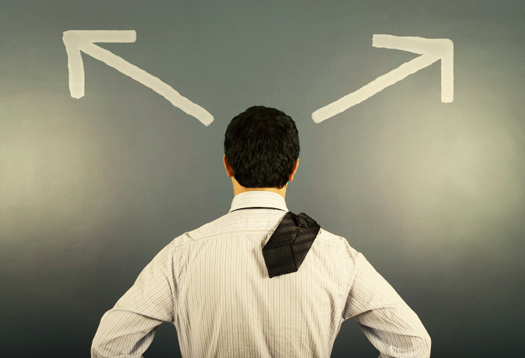
A “false choice” is when we are presented a situation as having only two choices, when in fact many alternatives may be available to us.
A false choice is when we are presented a situation as having only two choices, when in fact other alternatives may be available to us.
Often a false choice is a result of black and white thinking, in which we look at two extremes but don’t realize that the answer may be in a grey area between the two.
This kind of thinking limits our understanding of how the world really works. It creates a wrong and unhelpful view of reality by deluding us into thinking we have all the answers when we really don’t.
This post describes common false choices that are seemingly embedded in our culture and society, including “altruism” vs. “self interest,” “free will vs. determinism,” and “good vs. “bad.”
Trying to look past these false dichotomies can help us think of the world more practically and realistically.
Self-interest vs. Altruism
One popular false choice in our lives is that we have to either act in our self-interest or be altruistic. There is no room to do both.
If we do something for ourselves, we are being selfish. And if we do something for someone else, we must sacrifice our values. Either way, it seems like we can’t win.
However, what if we can act in ways that are beneficially to both ourselves and other people? What about when our values and other people’s values overlap?
What if we seek enjoyment and pleasure in helping others? And what if taking care of our own well-being is an important first step in helping others?
If this is possible, then we need to look beyond the false choice between “self-interest” and “altruism.”
Perhaps there is a middle ground in between where we can take care of our own happiness and simultaneously take care of others. I believe there is a delicate balance there.
Free will vs. Determinism
Another false choice is between “free will” and “determinism.” We often go to extremes in thinking that we are either in complete control over our lives or we aren’t in control at all.
I find the answer is somewhere in the middle.
We have some control over some aspects of our lives, like our choices and our habits, but we aren’t in control of everything, like our genetics, life circumstances, or random events.
Of course, some situations we have more control over than others.
We have a good amount of control over what we eat for dinner tonight, especially if we are aware of the decision as we are making it. But we don’t have any control over what the weather will be like tomorrow.
It’s important to acknowledge that we definitely have some control over our lives, just not in everything.
Being able to distinguish between the two is crucial for directing our focus to what we can change in our lives, and accepting what we cannot change.
Good vs. Evil
One false choice we make about people is that we tend to see an individual as only “good” or “evil.” However, we fail to see that people are often a mixed bag, with some positive characteristics and some negative characteristics.
In psychology this is known as the “halo effect.” It’s the reason why we see celebrities in commercials for food and cars. We see Dr. Dre in a Dr. Pepper commercial, and our minds build a positive association with the product. But even though Dr. Dre is a good rapper and producer, what does he really know about tasty soda?
People can be complicated. None of us are 100% good or 100% bad. Just because someone is skilled and talented in one area of life, doesn’t mean they are skilled and talented in everything.
The same applies to our own lives. If we find ourselves bad at something, it doesn’t mean we are a bad person – it just means we haven’t found our strengths yet.
Recognize that you are a person with both strengths and weaknesses. This is true for everyone else in the planet too. Try your best to avoid over-simplified caricatures of yourself and other people.
Enter your email to stay updated on new articles in self improvement:
